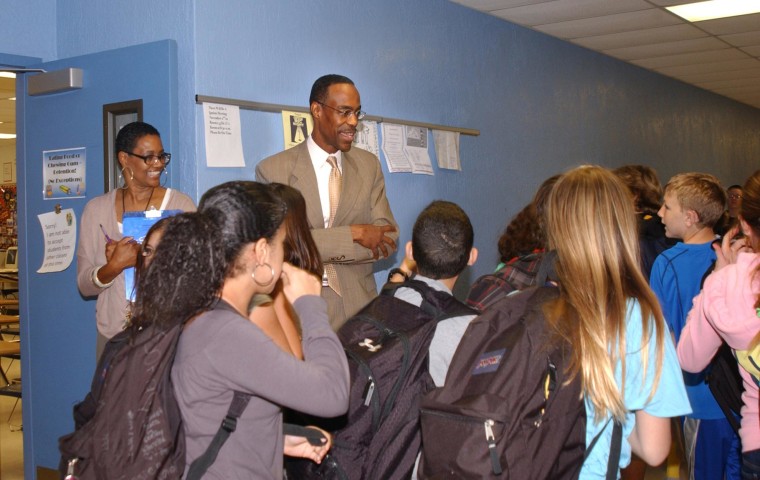A couple of years after arriving as superintendent of the Broward County Public Schools, Robert Runcie turned the district’s discipline policies upside down.
“Looking at the glaring expulsion, arrest and dropout rates for our black and Latino students, I knew that we had to do something dramatically different,” Runcie said.
He did away with calling in police for non-violent problems that could be handled by school officials in Fort Lauderdale-area schools that make up Florida’s sixth-largest school district.
Instead, he emphasized alternative approaches for the student body that is 29 percent Latino and 40 percent African-American. Students were referred to social workers and substance-abuse counselors. Detentions were held on Saturdays, in-school suspensions were used more, students were made to agree to behavior contracts and some were made to pay for any costs associated with misbehavior or to do community service.
The overhaul seems to be working, Runcie said.
“In terms of results, what we’ve seen so far is very encouraging,” he said. “Suspensions are down 66 percent, expulsions by 55 percent, and arrests by about 45 percent.”
Latino dropout rates nationwide are decreasing — a study of high school graduation rates found 78 percent of Hispanics graduated high school in 2010, an increase from 64 percent in 2000. A disciplinary approach which keeps students in the schools is important, said Patricia Gándara, co-director of the Civil Rights Project of University of California, Los Angeles.
Students were referred to social workers and substance-abuse counselors. Detentions were held on Saturdays, and in-school suspensions were used more.
"Removing so many poorly performing or problem students from our schools only encourages them to drop out and turns a school problem into a societal problem," she stated.
Mirian Lopez, whose freshman son attends South Broward High School, said she has seen the benefits of this approach. Her son did go through suspension for an incident but also has been going to a counseling group.
"He came home and said how lucky he was compared to other students who had so many problems at home," said Lopez in Spanish. "He realized what he did was dumb...I think talking to an adult who is not his parents or grandmother has been helpful. Sometimes they listen more to a different adult," she added.
About 700 Broward County students have gone through the district’s new discipline program, with only 25-30 repeating it. “That tells us students are learning to change their behavior,” Runcie said, “and ultimately we hope to see improved achievement and graduation rates.”
Like Broward County, other school districts with significant Latino student populations have been rethinking their approach to school discipline. In 2013, the Los Angeles Unified School District, which is 73 percent Latino, revised its school discipline procedures. School districts in Baltimore, Chicago and Denver have also reformed their discipline policies, moving away from “zero tolerance” and towards more creative solutions.
In January, U.S. Secretary of Education Arne Duncan said secondary schools have suspended or expelled an estimated two million students a year, and these punishments are being disproportionately applied to children of color and students with disabilities.
More than half of students involved in school-related arrests or referred to law enforcement are African-American or Latino.
A 2011 report by the National Council of La Raza found that every seven seconds during the school year, a Latino student is suspended; and that Latino students are 1.5 times more likely to be suspended and twice as likely to be expelled as their white peers. In Texas, where Hispanics are the majority in public schools, a groundbreaking longitudinal study found that nearly six in 10 public school students were suspended or expelled at least once between seventh and 12th grade.
One of the government’s recommendations to schools is to use out-of-school suspensions and law enforcement measures only as a last resort.
While many Latino educators and policy experts support the new guidelines on school discipline, some are concerned that there are practical obstacles to their implementation.
Pedro Noguera, professor of sociology at New York University, said that doing otherwise can lead to counterintuitive outcomes. “If a kid is not doing well or acting out in school, it makes no sense to remove him from school,” he said. “The best punishment should be more school!” If kids are not in school, regardless of their discipline problems, they are not learning, which only makes a bad problem worse, he said.
“When we deny kids access to school based on discipline, we are denying them their education – and that’s a civil rights violation,” Noguera said.
While many Latino educators and policy experts support the new guidelines on school discipline, some are concerned that there are practical obstacles to their implementation.
Daniel A. Domenech, executive director of the American Association of School Administrators, worries about the price tag. “While our response to the guidelines is positive, remember that making such changes requires staff training. It costs money,” Domenech said. “Doing the right thing could require resources that many schools and districts simply don’t have.” Many school districts are operating on tight budgets, feeling the effects of federal funding cuts and laying off teachers. Under such conditions, complying with the federal guidelines could be a financial burden, he said.
Still, Domenech is optimistic about the directives from the Department of Justice and Department of Education. “The combination of factors involved here shows that school discipline reflects not just an educational issue, but a larger societal issue,” he said. “The time has come to correct a lot of systemic problems, and having the government step up to get involved is a huge step in the right direction.”
